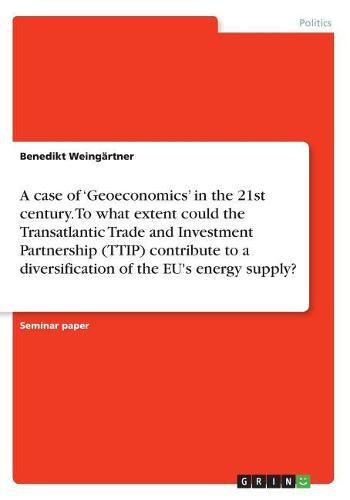Readings Newsletter
Become a Readings Member to make your shopping experience even easier.
Sign in or sign up for free!
You’re not far away from qualifying for FREE standard shipping within Australia
You’ve qualified for FREE standard shipping within Australia
The cart is loading…






Seminar paper from the year 2017 in the subject Politics - International Politics - Topic: International Organisations, grade: 14/20 ( gut ), College of Europe, language: English, abstract: Since the end of the Cold War, military capacities as a means of geopolitical power have been considered to become less important in favour of economic issues. But even though the latter do not have the same obvious striking force as gun power, certain economic aspects can also represent a fundamental element of national security. For the European Union, one of ‘well identified areas’ in order to protect the economy is energy supply, respectively energy security. Since the number of countries that deliver most of the oil and gas to the EU is very small and some of them are involved in geopolitical quarrels, the EU seeks to diversify its energy supplier structure. One opportunity to do so might be the Transatlantic Trade and Investment Partnership (TTIP). In this paper, I argue that TTIP is supposed to be, among others, a geoecomomic tool of the EU in order to diversify its energy suppliers and to reach more energy security, but this will only work on a medium to long term perspective and to a limited extent.
$9.00 standard shipping within Australia
FREE standard shipping within Australia for orders over $100.00
Express & International shipping calculated at checkout
Seminar paper from the year 2017 in the subject Politics - International Politics - Topic: International Organisations, grade: 14/20 ( gut ), College of Europe, language: English, abstract: Since the end of the Cold War, military capacities as a means of geopolitical power have been considered to become less important in favour of economic issues. But even though the latter do not have the same obvious striking force as gun power, certain economic aspects can also represent a fundamental element of national security. For the European Union, one of ‘well identified areas’ in order to protect the economy is energy supply, respectively energy security. Since the number of countries that deliver most of the oil and gas to the EU is very small and some of them are involved in geopolitical quarrels, the EU seeks to diversify its energy supplier structure. One opportunity to do so might be the Transatlantic Trade and Investment Partnership (TTIP). In this paper, I argue that TTIP is supposed to be, among others, a geoecomomic tool of the EU in order to diversify its energy suppliers and to reach more energy security, but this will only work on a medium to long term perspective and to a limited extent.